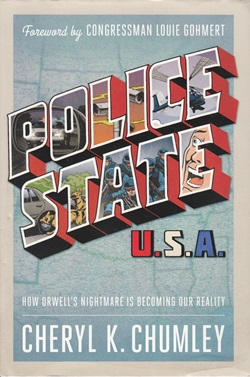
• NYPD has 35,000 computers installed for “precrime” purposes; a threat to civil liberties.
• “Big Data” here to stay, says NYPD commissioner.
By John Friend —
In the aftermath of the September 11 false flag attacks, civil libertarians and constitutionalists have made a variety of criticisms of the manner in which United States intelligence and law enforcement agencies at the local, state and federal level have responded to the supposed threat of terrorism, who have devised increasingly intrusive methods of collecting data and gathering intelligence, including definitively unconstitutional methods of surveillance, in their efforts to “keep America safe” and combat terrorism.
Since 9-11, local and state law enforcement agencies have increased their data-mining and collection activities in an effort to anticipate and even predict future crimes, including their location and participants. Referred to as predictive policing, many of the nation’s top law enforcement officials view this method of policing as “the wave of the future,” as New York City Police Department (NYPD) Commissioner William Joseph “Bill” Bratton CBE described it on July 21, 2015, in a panel discussion moderated by The New York Times Conferences entitled “Cities for Tomorrow.”
Bratton’s comments are quite chilling, as they relate to civil liberties and the future of human interaction.
With . . . computerization . . . we’re able to compile much larger amounts of information, analyze it more quickly, and respond more quickly to developing patterns and trends.
In two weeks . . . the whole process will be totally computerized, so that my cop in the street with his smartphone, my precinct commander sitting as his desk with one of the 35,000 computers we just installed, will have the ability, instantly, to draw up phenomenal amounts of information, collate it, analyze it, so that the ability to identify emerging patterns and trends will be much faster.
We’re also experimenting, quite successfully, with the next phase of American policing, that we will be leading, and that’s predictive policing. Once again, data mining huge amounts of information, but developing algorithms that will effectively mine that data in a way that the human brain cannot.
“Big Data” is here to stay, and it’s going to be something that’s part and parcel of policing.
Predictive policing, the controversial strategy being implemented in one form or another by various police departments across the nation, “tries to harness the power of information, geospatial technologies and evidence-based intervention models to reduce crime and improve public safety,” according to the National Institute of Justice (NIJ), a research, development and evaluation agency of the U.S. Department of Justice (DoJ). Bratton, a long-time advocate of predictive policing, stated that “the ‘Minority Report’ of 2002 is the reality of today.”
“Minority Report” refers to a science fiction movie in which fictional police use supercomputers and genetically enhanced minions to predict crimes.
9 COPIES LEFT!
Hardcover, 263 pages
“There are no secrets,” Bratton went on to declare. “There are none. If two people share a piece of information, it is no longer secret.”
Prior to becoming the police commissioner of New York City, Bratton served as the Los Angeles, California chief of police from 2002 through 2009 where he developed a collaborative partnership with the University of California, Los Angeles to adopt and implement various predictive policing strategies, including the use of sophisticated computer software to forecast and anticipate crime in the nation’s second largest city.
Under Bratton’s direction as police commissioner, the NYPD has increased its predictive policing techniques and strategies. It was recently announced it would begin utilizing HunchLab, a predictive policing software program developed by Azavea, a Philadelphia-based technology firm. HunchLab is currently utilized by the Miami Police Department as well.
The NIJ identifies computer software programs as instrumental in predictive policing techniques.
“Predictive policing leverages computer models—such as those used in the business industry to anticipate how market conditions or industry trends will evolve over time—for law enforcement purposes, namely anticipating likely crime events and informing actions to prevent crime,” NIJ states on its “Predictive Policing” webpage.
During the panel discussion, Bratton stated that officers and detectives in his department are “data mining huge amounts of information and developing algorithms that will effectively mine that data in many ways the human brain cannot.” In order to predict crime, police departments regularly monitor what people post online, analyze crime statistics and review other data collected by local and state governments.
Critics have blasted predictive policing as unnecessarily invasive and unproven in its efficacy. Many argue that the techniques involved with predictive policing are, in many cases, illegal under the U.S. Constitution’s Fourth Amendment. Others point to the fact that many of the strategies and techniques developed as predictive policing programs, in addition to the sophisticated computer software programs utilized by local and state police departments, come directly from the military.
The Pentagon has been instrumental in developing many of the computer software programs used in predictive policing, and many of the other techniques have been implemented and tested in countries occupied by the U.S. military as part of the War on Terror (WoT).
Bratton’s announcement comes on the heels of Federal Bureau of Investigation Director James Brien Comey, Jr.’s July 8, 2015 testimony in front of the U.S. Senate Committee on the Judiciary, entitled “Going Dark: Encryption, Technology, and the Balance Between Public Safety and Privacy,” wherein he “voiced his objections to civilian use of encryption to protect personal data—information the government has no automatic right to obtain.”
Reflecting the belief of many government officials at all levels—local, state and federal—Comey “believes that national security is more important than constitutional privacy protections or, apparently, due process.”
There can be little doubt that the various predictive policing techniques currently being implemented by various law enforcement agencies across the U.S., as well as the computer software required to facilitate this controversial policing strategy, are a direct result of the post-9-11 mindset promulgated by the mainstream mass media and political establishment. September 11 not only officially launched and justified the pre-planned WoT, in which America’s military, financial and human capital would be utilized to wage war against Israel’s enemies in the Middle East, paving the way for Zionist hegemony in the region, but also created the “homeland security” paradigm of domestic law enforcement activities. Pervasive, unconstitutional surveillance and data collection are now justified in the name of combating “terrorism” and “preventing crime,” all of which is masqueraded as a means of protecting the American people.
Fortunately, more and more Americans are recognizing these supposed “predictive” and “preventative” policing and intelligence gathering techniques as the tyrannical, un-American violations of the Constitution they truly are.
John Friend is a California-based writer who maintains a blog.



filled some to the sleaziest, foul criminals we have ever seen.
Vote them all out.
10 reasons the U.S. is no longer the land of the free